Distinguished Graduate Alumni Award
Presented every year to an alumnus/a from the College of Medicine's Ph.D. or M.S. program who has demonstrated outstanding achievement in basic, clinical or applied research; education; industry; public service/humanitarianism; and/or outstanding
commitment to the College of Medicine community.
2023 Distinguished Graduate Alumni Award Winner

Andra S. Stevenson, Ph.D.'01
Andra S. Stevenson, Ph.D.’01 is Global Senior Director for Medical & Scientific Affairs at Merck & Co, Inc.
After earning his bachelor’s degree in biology and sociolinguistics at the University of Vermont, he worked as a research technician in the UVM Department of Pharmacology before eventually enrolling as a Ph.D. candidate. As a researcher in Professor Mark Nelson’s lab, Dr. Stevenson focused on calcium signaling in vascular smooth muscle to gain a better understanding of myogenic tone and blood vessel regulation. His groundbreaking research demonstrated the importance of how calcium regulates gene expression in vascular smooth muscle cells.
In 2001 as a Postdoctoral Fellow, Dr. Stevenson joined the Somlyo Lab at the University of Virginia School of Medicine, one of the most well-regarded research groups in the field of vascular biology. Andra became an Assistant Professor of Research at UVA in 2005, and in late 2006, took on a role in industry as a Senior Research Biologist at Merck, where he managed a team of scientists supporting various therapeutic areas/disease areas.
During Dr. Stevenson’s tenure at Merck, he has held a variety of role with increasing responsibilities across several therapeutic areas (TAs), including hypertension, heart failure, respiratory and diabetes. In 2015, Andra moved from Discovery Sciences (MRL) to US Medical Affairs as a Medical Affairs Director to support the Merck Field Organization and subsequently, in 2016, he returned to MRL within the Global Center for Scientific Affairs as a Research Scientific Director to support clinical trial activities. After several years, Andra held the dual position of Scientific Director for Medical Affairs and US Regional Director of Medical Affairs, where he was responsible for establishing US strategy for Heart Failure as well as strategic execution activities for 4 additional therapeutic areas (Diabetes, Thrombosis, Respiratory, and Liver Disease). Today, Dr. Stevenson is the Senior Director in Global Medical and Scientific Affairs overseeing Heart Failure TA but has had other responsibilities in the role of thrombosis lead. He is the recipient of a number of industry awards and is a member of many scientific societies, including the American Heart Association, American College of Cardiology, American Diabetes Association, European Society of Cardiology, European Association for the Study of the Liver, European Association for the Study of Diabetes and The Association of Black Cardiologists.
Over the course of his career, Dr. Stevenson has been committed to mentoring junior scientists, including students of color. Dr. Stevenson has mentored over 100 mentees in conjunction with various organizations in both the private and public sectors and through these affiliations he has had the privilege and honor of giving back to young scientists. Dr. Stevenson has been a role model for young scientists and has served to advance patient care by supporting the development of a diverse pipeline of world-class researchers and leaders.
Dr. Stevenson has four children with his wife, Fumi, and currently lives in New Jersey.
2022 Distinguished Graduate Alumni Award Winner

Elizabeth J. Kovacs, Ph.D. '84
Dr. Elizabeth J. Kovacs received a BA in Biology from Reed College in 1978 and a PhD in Cell Biology from the University of Vermont in 1984. She was a postdoctoral trainee at the National Institutes of Health (NIH) in the Biological Response Modifiers
Program prior to joining the faculty in the Department of Cell Biology, Neurobiology and Anatomy at Loyola University Chicago in 1987. At Loyola, Dr. Kovacs moved through the ranks to full professor and then joined the Department of Surgery as
Vice-Chair of Research. She was the Director of the Alcohol Research Program and the Director of Research of the Burn and Shock Trauma Institute before relocating her laboratory to the University of Colorado Denver Anschutz Medical Campus in 2016.
She is now a Tenured Professor of Surgery, and the Director of Burn Research and the Alcohol Research Programs.
Dr. Kovacs was the recipient of the first Senior Scientist Award at Loyola University Medical Center and a fellow
in the Executive Leadership in Academic Medicine (ELAM) Program for Women, Drexel University, Philadelphia, PA. She was President of the Society for Leukocyte Biology and the Shock Society. Additionally, she served as the Chair of the Committee
on Public Affairs for the American Association of Immunology. She is currently a member of the Board of Directors of the Federation of American Societies for Experimental Biology (FASEB).
Research in the Kovacs laboratory centers
on innate immunity and inflammation. Most recently, her laboratory has been studying tissue injury and repair in trauma patients and in murine models. The focus of this work has been on the role of leukocytes and inflammatory mediators in the
blood and lungs of burn patients with inhalation injury along with smokers and drinkers. While the lungs remain Dr. Kovacs’s favorite inflatable organ, her lab has also worked extensively on the skin, intestine, liver and the brain in models
of injury. Much of this research includes clinically relevant “second hits,” such as alcohol intoxication and infection, along with advanced age. Examining end-organ damage, the lab has established the role of the gut-liver axis in
the development of lung inflammation and is working on the gut-brain axis in neuroinflammation and behavior after remote injury.
To fund her research, Dr. Kovacs has received numerous grants from multiple NIH Institutes, the Department
of Defense, the Veterans Administration, the Dr. Ralph and Marian C. Falk Medical Research Trust, Margaret A. Baima Endowment Fund for Alcohol Research and a series of Illinois Excellence in Academic Medicine Grants. She continues to serve on
NIH and other grant review panels and on several journal editorial boards. Her laboratory has published 270 manuscripts and review articles and she is international recognized for her work in both alcohol & immunity and aging & inflammation.
In spite of these feats, Dr. Kovacs believes that by far her greatest accomplishment is her daughter, Cathy, and after that being responsible for the training of more than 125 individuals ranging from high school students to visiting professors,
and mentoring countless junior faculty across the country.
2021 Distinguished Graduate Alumni Award Winner
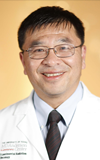
Junjie Chen, Ph.D. '93
Dr. Junjie Chen is interested in determining the molecular mechanisms underlying genomic instability and tumorigenesis. He has been working in the field of DNA damage response and cancer biology especially focusing on BRCA1 and BRCA2 since he joined
Mayo Clinic as an independent group leader in 1999. Before that, he received B.S. from Fudan University in China and Ph.D. from the University of Vermont. He completed his postdoctoral trainings at Harvard Medical School. In 2006, he moved to
Yale University as a full professor at the Department of Therapeutic Radiology and moved again in 2009 to the University of Texas MD Anderson Cancer Center, where he is the professor and chair of Department of Experimental Radiation Oncology.
His research team has discovered many new components involved in DNA damage repair. His lab conducts mass spectrometry-based proteomics studies and uses CRISPR screens to investigate gene-gene and gene-drug interactions involved in DNA damage
response and cancer therapy.
2020 Distinguished Graduate Alumni Award Winner

Marilyn Cipolla, Ph.D. '97
Dr. Cipolla is Professor in the Department of Neurological Sciences with joint appointments in Obstetrics, Gynecology & Reproductive Science and Pharmacology at the University of Vermont Larner College of Medicine. She received her B.S. in Electrical
Engineering in 1988 from the University of Vermont in 1994, then went on to obtain her Ph.D. in the same program in 1997. Her current research is focused on cerebral hemodynamics and blood-brain barrier function under normal and pathological conditions
including ischemic stroke, hypertension and eclampsia. Dr. Cipolla is on the Editorial Boards of Stroke (Section Editor), Hypertension, Translational Stroke Research, and Journal of Cerebral Blood Flow and Metabolism and has published over 100 peer-reviewed articles. She has been a member of the National Institute of Neurologic Disorders and Stroke (NINDS) Stroke Progress Review Group and the Stroke Planning Workgroup, and is an advisor to the NINDS Stroke
Preclinical Assessment Network (SPAN). Dr. Cipolla is a Fellow and Established Investigator of the American Heart Association and is the past President of the Perinatal Research Society. She is also on the Board of Directors for the Cardiovascular
Research Institute of Vermont. Dr. Cipolla has received a number of awards, including the James A. Shannon Director’s Award from the NIH, the President’s Achievement Award from the Society for Gynecologic Investigation and the Georgio
Pardi Award. In 2015, she was named University Scholar by the University of Vermont. Dr. Cipolla has been continuously funded by the NIH since 1998 and has received grants from the American Heart Association and the Preeclampsia Foundation.
2019 Distinguished Graduate Alumni Award Winner
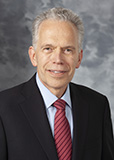
Richard (Rick) Moss, Ph.D. '75
Dr. Moss came to UVM after receiving the B.S. in Biology from the University of Wisconsin, Oshkosh. He did his thesis work in the laboratory of the late William Halpern – David Warshaw, UVM Professor and Chair of Molecular Physiology and
Biophysics, says that Dr. Moss’s thesis was “a blueprint for designing the most incisive experiments to probe intriguing questions in muscle function”. He then did postdoctoral studies at the Boston Biomedical Research
Institute before joining the faculty of the University of Wisconsin, Madison in 1979. Moss was chair of the UW Department of Physiology from 1988 until his appointment in 2009 as Senior Associate Dean in the UW School of Medicine and Public
Health. He was also founder of the UW Cardiovascular Research Center, co-founder and executive director of the UW MS in Biotechnology Program, and PI of program project grants focused on regulation of myocardial contraction and on cardiac
arrhythmias. Moss’s research program currently emphasizes regulation of contraction via thick filament accessory proteins and cooperativity in the binding of myosin to thin filaments. He has been recognized for his research contributions
with conferral of an honorary M.D. degree by Uppsala University (Sweden). Moss has served in several international leadership positions including Secretary General of the International Society for Heart Research (co-founded by the late Norman
Alpert, former chair of the UVM Department of Physiology and Biophysics), International Editor of The Journal of Physiology (London), the executive council of the Biophysical Society, and co-organizer with John Solaro (University of Illinois,
Chicago) of the international Myofilament Meeting held biannually in Madison. He has been member of the editorial boards of numerous journals, and also of NIH study sections and other peer-review committees. More than twenty former
graduate students and trainees from the Moss laboratory are now members of the faculties of U.S. academic medical centers.
“His commitment to the scientific community is immense, and he strives continually to
bring scientists together to further the pace of research” - David Warshaw, Ph.D. '79.
As Senior Associate Dean for Basic Research, Biotechnology and Graduate Studies in the School of Medicine and Public Health, Dr. Moss has played key roles in establishing new programs of research in areas such as human genomics and precision medicine,
realigning basic science departments by research rather than strictly disciplinary themes, developing and overseeing collaborative partnerships with industry, and creating support for research trainees in professional and career development.
He is currently chair of the Partnership Education and Research Committee of the Wisconsin Partnership Program, which funds faculty and staff initiatives designed to improve health and healthcare for the citizens of Wisconsin. He is now
involved in a new and rapidly growing innovation center (The Isthmus Project) established as a collaboration between the school and UW Health that is focused on the development and commercialization of research discoveries, inventions and new
models of patient care.
2018 Distinguished Graduate Alumni Award Winner
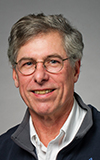
Nicholas Heintz, M.S. '77, Ph.D. '79
Dr. Heintz is a respected leader in graduate education and within the Departments of Pathology and Laboratory Science and Microbiology and Molecular Genetics at the University of Vermont. After postdoctoral training at the University of Virginia,
he began his career as a professor of pathology at UVM in 1983, before receiving a secondary appointment to the Department of Microbiology and Molecular Genetics in 1992. He transitioned to professor emeritus in 2014.
His research focuses on cell signaling pathways that control cell cycle progression, cell survival, and cell death, particularly in cancer cells, and his work has been published in over 100 peer-reviewed journal articles, book chapters and invited
reviews. He has presented his research at many other Universities and a wide range of scientific meetings. Dr. Heintz’ research has made him an integral member of the UVM Cancer Center since 1987. In his lab, he has trained more than ten
doctoral students, seven postdoctoral fellows and numerous undergraduate students.
His leadership extends beyond scientific endeavors, and his impact on graduate education at the University has been sustained over many years. He chaired the Graduate College Executive Committee, and has served as member of numerous departmental
and Graduate College committees. From 2013 to 2015, he served as the director of the Cellular, Molecular and Biomedical Sciences Graduate Program, the largest interdisciplinary graduate program in the biosciences at UVM.
2017 Distinguished Graduate Alumni Award Winner
 David
Warshaw, Ph.D. '79
David
Warshaw, Ph.D. '79
Dr. David Warshaw has pursued a renowned career as a biomedical scientist, teacher, and mentor during more than 40 years at the University of Vermont.
His research has focused on muscle contractility, starting with research on blood vessels
while a doctoral student at UVM. As a postdoctoral fellow he accomplished a major technical feat -- the first measurements of the contractile properties of single smooth muscle cells. After establishing his own laboratory at UVM in 1983, his research
evolved to the study of individual molecular motor proteins (myosin); pioneering the use of state-of-the-art techniques, including single molecule motility assays and laser traps. With these new approaches he was able to measure the force generated
by a single motor molecule, and thereby provided new insights into the fundamental properties of the contractile machinery of muscle as documented in his 125 peer-reviewed publications.
In 1995 Dr. Warshaw became chair of the
Department of Molecular Physiology and Biophysics, and recruited a number of outstanding scientists in the molecular motor and protein structure and function fields. With these colleagues and other external collaborators, he developed a National
Institutes of Health funded Program Project Grant (PPG), which was renewed three times. This PPG centered on translating the fundamental insights of motor proteins into understanding genetic forms of cardiac hypertrophy and heart failure. Dr.
Warshaw has received several prestigious awards. He is an Established Investigator of the American Heart Association (AHA) and a Fellow of both the AHA and Biophysical Society. He became a University Scholar in 1999 and in the same year was inducted
into the Vermont Academy of Science and Engineering. He has served on numerous editorial boards and study sections, and organized numerous international symposia. In 2014, he was named to the Board of Directors of the Cardiovascular Research Institute
of Vermont. Dr. Warshaw has taught undergraduate, graduate, and medical students, and has mentored over 25 graduate students and postdoctoral fellows, many of whom have gone on to successful careers in academia.
2016 Distinguished Graduate Alumni Award Winner
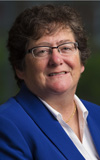 Anne E. Huot, M.S. '88, Ph.D. '90
Anne E. Huot, M.S. '88, Ph.D. '90
Dr. Anne Huot has dedicated her career to the transformative power of education and the opportunities higher education presents for contributing to and bettering society. Throughout her 23 year experience as a faculty member and senior administrator,
and now as president of Keene State College, Dr. Huot has focused her attention on academic excellence as her highest priority. Her work has been directed toward developing systems and programming that encourage and support student learning and
success, and preparation for active citizenship and meaningful careers. To her role as president of Keene State College, Dr. Huot brings a vision that is informed by her experience as a first generation college student, a native of New Hampshire,
and an educator with extensive background in public higher education. She believes passionately in the need for accessibility to higher education for all students and the unique role, mission, and opportunities provided by institutions of public
higher education. Her history as a faculty member and academic leader demonstrate her commitment to these values. From 2007 to 2013, she served as provost and vice-president for academic affairs at The College at Brockport, State University of
New York, during which time she created an Office for Diversity, established a School of Business and Graduate School, and revised the general education program to introduce interdisciplinary teaching and learning. She has also served as associate
provost and executive vice provost for the Office of Academic Affairs, State University of New York-System Administration in Albany, and she was a member of the University of Vermont faculty for fourteen years, including serving in the role of
Graduate College executive dean. She has said that her training as a scientist informs her work as a university leader, allowing her to see problems from multiple angles, test hypotheses, and use data to inform decision making.
2015 Distinguished Graduate Alumni Award Winner
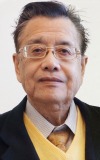 Patrick Y-K Wong, Ph.D. '75
Patrick Y-K Wong, Ph.D. '75
Dr. Wong received his Ph.D. in biochemistry from UVM in 1975. He went on to have a distinguished career as a pioneer in elucidating the role of prostaglandins in inflammation, cardiovascular disease and cancer. Dr. Wong was also a Fogarty Senior International
Research Fellow with Nobel Laureate Professor Bengt Samuelsson at the Karolinska Institutet, Stockholm, Sweden. He is a Professor Emeritus of the Department of Pharmacology at New York Medical College and Chairman, CEO of BioProst Pharmaceuticals.
Dr. Wong is an inspired choice for this award. He is an example of someone who was educated here at UVM and has continued to extend the scientific boundaries in his field. He is a reminder that one’s education never really ends – that
getting a Ph.D. or any other degree is really just the beginning for those who bring intellect and curiosity and determination
with them to the laboratory every day.
Since earning his doctorate in biochemistry here at UVM in industry leadership. His pioneering research on biosynthesis and metabolism of prostaglandins led to his later work on the role of lipid mediators in inflammation, apoptosis and cancer. For
more than 30 years, his research in eicosanoids and clinical pharmacology was supported by the National Institutes of Health, the American Heart Association, and others. He has more than 135 publications in peer-reviewed journals. He was invited
twice as visiting professor at the Karolinska Institute in Nobel laureate Bengt Samuelsson’s laboratory -- the first time before Bengt won the Nobel Prize. In 2001, he was the recipient of the Karolinska Institute Research Medal. He joined
the faculty of New York Medical College in 1979, leaving in 1994 to become professor and chair of cell biology at the University of Medicine and Dentistry of New Jersey. He returned to New York Medical College in 2002 and became Professor Emeritus
in 2005. Dr. Wong has extensive experience in the pharmaceutical industry. In 2001 he founded Bioprost Pharmaceuticals, LLC, in the United States and continues to serve as its Chairman. He is a sought-after advisor and innovator, and is currently
engaged in a large biomedical research and clinical project in China that has significant collaborative opportunities worldwide. He also founded Nobel Forum, USA, a non-profit organization to promote the advances of science and medicine in China
and around the world. And this impressive journey started, in large measure, here on the UVM College of medicine campus.
2014 Recipient
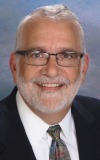 Peter Paradiso, Ph.D. '77
Peter Paradiso, Ph.D. '77
Dr. Paradiso recently retired as Vice President, new business and scientific affairs for Pfizer Vaccines, a Division of Pfizer, Inc. In this position, he was responsible for global scientific affairs and strategic planning within the vaccine research
and development group and for commercial oversight of products in development. He has worked in the field of vaccine development for the past 28 years. Dr. Paradiso has published broadly in the field of pediatric vaccines, especially in the areas
of glycoconjugates, combination vaccines and respiratory viral vaccines. He has been involved in the development and the global registration of many major vaccines.
Dr. Paradiso served as a member of the National Vaccine Advisory Committee (NVAC) and is currently a member of the Advisory Council on Immunization for New York State and a liaison member of the CDC's Advisory Committee on Immunization Practices.
He has also served as an advisor to the WHO's Strategic Advisory Group of Experts on vaccines and to the GAVI Task Force on Research and Development.
Prior to his graduate degree, he earned a B.S. in chemistry from St. Lawrence University.
2012 Recipients
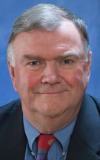 James Aiken, Ph.D.’70
James Aiken, Ph.D.’70
James Aiken is President and Chief Executive Officer of Keystone Symposia on Molecular and Cellular Biology, a 40-year-old, educational nonprofit organization that annually conducts 50 to 60 biomedical conferences attended by about 14,000 scientists.
Prior to his work with Keystone Symposia, Dr. Aiken had a distinguished career spanning 32 years as a research scientist and research executive in the pharmaceutical industry. He was Senior Director of Therapeutic Area Strategy for Pharmacia
Corporation in Peapack, NJ until the company was acquired by Pfizer in 2003. Before that he was Director of Biology in Stockholm and Uppsala for the Swedish branches of Pharmacia & Upjohn, Director of Metabolic Diseases Research for
the Upjohn Company in Kalamazoo, Michigan and held various research positions at Upjohn in the areas of atherosclerosis, thrombosis, and diabetes. At Eli Lilly and Company in Indianapolis, he conducted research in the field of smooth muscle
function, as it relates to vascular biology and hypertension as well as uterine physiology and parturition.
Dr. Aiken has received numerous honors and served on committees influencing research direction. He was a
long term member of the Pharmacology Advisory Committee of the Pharmaceutical research and Manufactures Association Foundation; a former member of the Board of Directors and on various committees of the Michigan Affiliate of the American Heart
Association; a member of the Swedish Foundation for Strategic Research Boards for Cardiovascular Diseases and Biopolymers and Biocompatible Materials. He was an adjunct Professor of Pharmacology at Michigan State University and adjunct Assistant
Professor of Medicine at Indiana University School of Medicine. In 1998 he received a Graduate College Alumni Scholar Award from the University of Vermont. He is currently on the Board of Directors of the Global Food Protection
Institute. Dr. Aiken received his undergraduate degree in Biology from Dartmouth College in 1965 and his Ph.D. in Pharmacology from the University of Vermont in 1970.
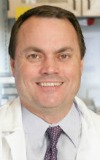 David Lyden, M.D.,Ph.D. ’86
David Lyden, M.D.,Ph.D. ’86
David Lyden is a pediatric neuro-oncologist at Memorial Sloan-Kettering Cancer Center. He holds a joint appointment at Weill Cornell Medical College and is the Stavros S. Nairchos Chair and Associate Professor of Pediatrics and Cell and Developmental
Biology. Dr. Lyden has made several fundamental discoveries which involve the role of bone marrow-derived stem and progenitor cells in tumor vasculogenesis and in metastasis. He and his colleagues showed the first evidence of genetic regulation
in vasculogenesis with the discovery of one family of genes called Id1-4 in early blood vessel development in embryogenesis and in tumorigenesis. His laboratory was the first to identify two bone marrow-derived cells, endothelial progenitor cells
(EPCs) and hematopoietic progenitor cells (HPCs) that participate in the formation of new blood vessels in primary tumors. In recent years, his team has shown evidence that secreted factors from primary tumors prime certain tissues for tumor cell
engraftment. In response to these secreted factors, tumor associated cells such as hematopoietic progenitor cells cluster at ‘pre-metastatic niches’, creating an environment which is conducive for tumor cell adhesion and invasion.
At the pre-metastatic niche, newly recruited myeloid cells collaborate with other cells types residing in the tissue parenchyma. Together, these cells provide a platform of chemokines, growth factors, matrix-degrading enzymes and adhesion molecules
that accelerate metastatic niche formation. This model suggests that systemic therapies targeted to the metastatic microenvironment should be used early in treatment of tumors. Most recently, he has found that tumor-secreted microparticles, known
as exosomes, induce bone marrow progenitor cells and pre-metastatic niche cells towards a pro-metastatic phenotype (Nature 1999, 2001, 2005, Nature Reviews Cancer 2009 & Nature Medicine 2012.)
Dr. Lyden’s honors and awards include: Distinguished Alumnus Brown University (2003) and the Leonard Weill Memorial Lecturer Award (2007). His work was highlighted in “Nature Milestones: Cancer”. In 2007, he was awarded a Presidential
Medical Distinction Bial Award by President Cavaco Silva of Portugal. He is Co-Senior Editor for “Cancer Metastasis: Biologic Basis and Therapeutics”, the first cancer metastasis textbook published by Cambridge University Press (April
2011), and has been featured as one of fifteen cancer experts in the book ‘Why Millions Survive Cancer: The Successes of Science” (author: Lauren Pecorino, Oxford Univ. Press). He is also the recipient of the 2011 Duke University Residency
Alumni Award and Lecture. He will be honored for his work in metastasis as recipient of the Inaugural I.J. “Josh” Fidler Innovation in Metastasis Research Award, given by the Metastasis Research Society and Anti-Cancer Inc., USA at
the International Metastasis Research Society Meeting in Brisbane, Australia in September 2012. Dr. Lyden was educated at the, University of Vermont (PhD 1986), Brown University (MD 1989), Duke University (Residency) and Memorial Sloan-Kettering
Cancer Center (Fellowship).
Previous Winners
2010 Brooke T. Mossman, M.S. '70, Ph.D. '77
2005 Mark Brann, PhD ’85